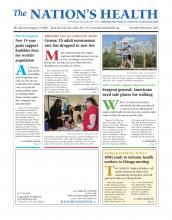Many Americans spend time living in poverty
About 42 percent of Americans will have experienced at least one year of extreme poverty by the time they turn 60, according to a study published in July in PLOS One.
Using data from the Panel Study of Income Dynamics, the longest-running longitudinal household survey in the world, researchers found that by age 30, nearly 23 percent of Americans will have experienced at least one year of extreme poverty; by age 40, the percentage reaches nearly 32 percent; and by age 50, it grows to more than 37 percent. In addition, nearly 62 percent of Americans will experience at least one year of poverty, 45 percent will experience at least two years of poverty, and nearly 30 percent will experience four or more years of poverty.
“As is the case with research on absolute poverty dynamics, a predominate pattern is that individuals are often likely to experience one or two years of poverty and then rise out of poverty, with perhaps an additional spell down the road,” the study stated. “Consequently, much of the poverty dynamic is characterized by a fluid movement into and out of poverty.”
Military women report more unintended pregnancy
In the U.S., unintended pregnancy rates are higher among active-duty women in the military than among the general population, found a new study published in September in Contraception.
Based on 2011 health survey data from the Department of Defense, the study found that while 5 percent of women among the general population reported an unintended pregnancy in 2011, 7 percent of women in the military did. Within the military, unintended pregnancy rates were higher among women in the Navy and Marine Corps, among married women and among enlisted women compared to officers. The study authors noted that a number of factors may contribute to the higher military rate, such as barriers to contraceptive access and a high rate of sexual assault.
“The unintended pregnancy rate in the United States is already significantly higher than that of many other developed countries,” said study lead author Kate Grindlay, MSPH, senior project manager at Ibis Reproductive Health and APHA member. “The fact that unintended pregnancy is even more common among U.S. servicewomen than the general U.S. population is concerning and highlights the need for increased attention to contraception access.”
- Copyright The Nation’s Health, American Public Health Association









